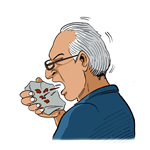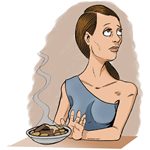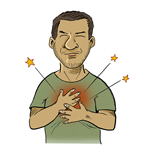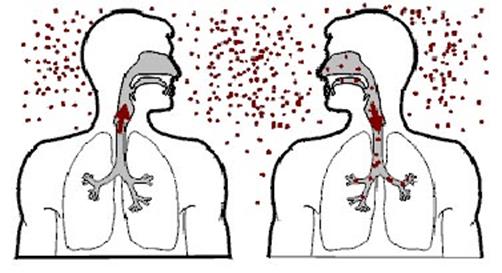Symptoms
|
 1. Persistent cough 1. Persistent cough
|
|
|
|
 2. Sputum with blood 2. Sputum with blood
|
|
|
|
 3. Loss of appetite and weight loss 3. Loss of appetite and weight loss
|
|
|
|
 4. Night sweating 4. Night sweating
|
|
|
|
 5. Chest pain 5. Chest pain
|
|
|
|
 6. Weakness and fatigue 6. Weakness and fatigue
|
|
|
|
 7. Fever 7. Fever
|
Transmission

Tuberculosis is spread from person to person by the inhalation of droplets released in the air when a tuberculosis sufferer coughs, sneezes or speaks. Usually, the disease is spread to people through coming into contact with a TB sufferer for several hours a day. Young children and the elderly are more susceptible, as well as individuals with diabetes mellitus, chronic renal insufficieny, leukemia or lymphomas and individuals addicted to alcohol or to toxic substances. Other susceptible groups are individuals taking corticosteroids or immunosuppressive medicines, those who are HIV/AIDS -positive, as well as individuals who are undernourished.
Treatment
For the treatment of the disease, seek medical assistance. Tuberculosis almost always can be cured; however, you have to take more than one medicine, for an extended period of time. Most probably you will start feeling better a few weeks following the initiation of therapy, but you should continue to take your medicines systematically. It is very important to follow the doctor's instructions.
Prevention


If you suffer from pulmonary tuberculosis, there are a few things you can do to protect yourself and the people around you:
-
Τhe most important thing is to take your medicine as prescribed by your doctor
-
Cover your mouth with a tissue when coughing, sneezing or laughing and place the tissue inside a bag, close it well and throw it away
-
Do not go to work or school and avoid close contact with other people
-
Your room should be well ventilated (if it is not very cold outside)
When to seek medical advice
If your cough lasts for more than three weeks or if you cough up blood, you should seek medical assistance.
Vaccines
There is a vaccine for tuberculosis called BCG. In Greece, the BCG vaccine is included in the National Immunization Schedule and is given at the age of 6 years. The prevention of tuberculosis with vaccination at childbirth is recommended for the children of immigrants and the Roma population.
The Mantoux test is recommended when entering the country and if the test is negative, you will have a repeat test when you are issued a residence permit. If your Mantoux test is positive, further investigation and treatment will be carried out.
References
keelpno
who
nhs
National Immunization Program for Children and Adolescents 2011 References




















